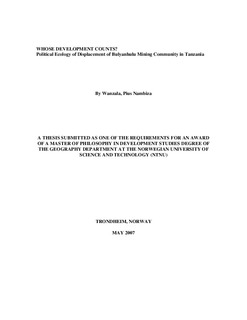| dc.description.abstract | In 1996, an estimated 400,000 people in a gold mining community in rural Tanzania were forcibly evicted from the area to allow for the development of a large-scale gold mine project to take place. The good-intentioned project was based on the idea of putting national development and public interest before the individual or community development and private interest. This thesis set out in 2006 to investigate how the livelihoods of the displaced community were affected by this development project. The main conclusion is that the displaced individuals had become poorer in 2006 than they were before the eviction. National development has impoverished and underdeveloped them.
The study was guided by the theory of political ecology, which I used in combination with the impoverishment risk model, focusing in particular on livelihoods. Data for this study was collected through qualitative methods as well as from secondary sources.
Using political ecology, I have been able to argue that the case study reflects a conflict over land resources, and struggles and contestations over power and meanings in society. The apparent local conflict should also be understood from the global political economy perspective.
The findings confirm the impoverishment risk model which argues that during displacement or resettlement, unless mitigative measures are taken, it is likely that the displaced people would become landless, homeless, jobless and food insecure among other negative elements. These risk elements have been found in the study area, and according to the respondents, they were a result of the displacement. On the other hand, the livelihood analysis shows how individuals and communities have been able to cope in the face of change. One of the main lessons from the study is that the project-affected people have some agency and are eager to develop themselves rather than wait for development to be brought to them by government or foreign investors. Their key concern at the moment, however, is lack of a fair compensation. | nb_NO |
